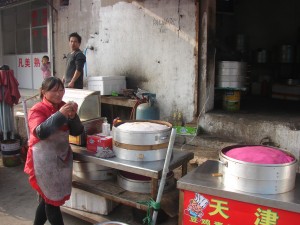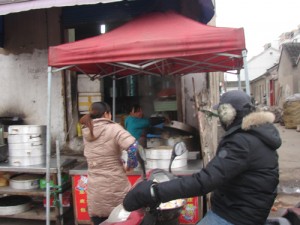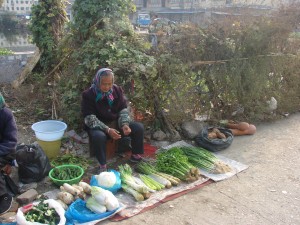Her hand is a smile opening him to this place – Che Fang; the bitter twists of steam from oil drums used to fry dumplings and egg cakes on this nameless path to the school where he teaches …
…the Chinese mist gentling the bareness of people’s lives here, the threadbare clothing and shoes. The breeze is sharpened by snow, brimming with rumoured tears, a history we have not read but which wears and tears at bodies and minds.
Over the centuries history fashioned trails and huts into streets and buildings crumbled, a slow shattering against his fingertips, the bark or plaster shuffling to the ground. A necklace of trees droops around the newer roads and shops, around the throats and shoulders of canals and shacks, knocking his heart open. Downpours turn the leaves to laughter, shivering and splitting their sides.
Here, in Che Fang, the moments are years dazzled with leaves and the grain on walls smeared with graffiti: requests and pleas in Chinese for repair work, plumbing, fixing scooters, new business cards. The rain has hungered over here from the north, showers with the sharpness of teeth. Tiny ivory hail splintering against pebbles and raincoats.
That man over there trudging in a stillness that knows no end, each step a spadeful of grief thudding into shallow graves called streets.
Her hand is a smile opening: she is the sock lady he once spoke of, a face that has never known makeup; a map that has been slowly, peacefully, wrenched and detailed further with new paths in the half-lit years of fingers shedding skin in the grasp for food …

… and then, yet again, the rain, thwacking on bark and skin and eyes, prising open the fragrance and the reek in everything. Each drop snapping against twigs and leaves, elderly elven women scolding, tut-tutting. The rain is always womanly to him, dancing against him, a cat rubbing thighs and torso.
The sun on giant rows of knuckles which appear in the mist as the backs of men loading bricks and rubble onto a truck. Or the tailor squatting in the filth, dabbing up cloth to the quarter-light. And the welder, immersed in his Guy Fawkes display. Then the dust-rain lifts again and now they, and the street sellers squatting on mats, are fists banging at the door of the heart, in another rain, a ghost-rain, which never stops.
Each pearl of mizzle wishing to be a blessing, scalloped against her cheeks, each the tiniest of shelled oysters.
There is a sniff of sea in everything, the mist eddying against remembrance and the presence of boots spanking the pavements, obliterating the sound of rain which comes and goes, tries to leave and stays, has to stay, as does that mother or grandmother pressing close an infant in her arms. Rocking back and forth, stilling the baby’s yowling, delighting in their weeping, because it’s so real, so real: a crying which is the leaves in a breeze which surge and breathe into his ears.
And knowing many here sometimes don’t understand what he says, the only “foreigner”, laowai, in Che Fang. This knowledge is in that man learning not to stare at him, the alien; a potato man now learning to nod, to just grin and go on turning sweet potatoes on the pan on the back of his cart.

In the veins on the back of the potato man’s hands, the deeply mottled skin, are centuries of his ancestors gleaming through the thrum in the red beneath the blue in his veins.
The skies seem to have never been blue. They have always been lead. A heaviness informing the lightness of the soil beneath this laowai’s muddy sneakers as he squats on a low wall and watches. Here, between the alleyways piled with garbage, are small plots of vegetables, hoarded for these times of iciness.
It all brings to his remembrance the richness of abandonment. He recalls being seven years old, his first day in a boarding school in Bloemfontein. The crisp linen on rows of dormitory beds puckering his nose, the sudden polish on floors sharp against his face. The other children will only arrive in two days’ time. He gapes out a dormitory window at the car his parents slowly get in (always slowly in memory) and drive away. Later on in life, like now, he thinks there should have been a final wave up at his second floor window, a last goodbye. Just the ironed rows of children’s beds and cupboards around him, steeped in silence: unopened books, unopened fellow children.
This place, Che Fang, has that silence.
A “village” abandoned somewhere on the outskirts of Suzhou. Each moment filled with people, (people-mountain, people-sea as the Chinese describe crowds), or their ghosts, their history, lingering among the rain on leaves and scavenged refuse piled up to sell, and vegetable beds between the alleyways and tiny shops … each moment that long wished-for wave goodbye, those backs turning on him.
These words kindling the leaves and streets and canals, all these smiling hands and clenched faces, blurring them with a glow, the texture of memory, always here, tapping the heart open.




























